Did you know that logistics software can reduce warehouse space by up to 70% and boost labor productivity tenfold? This level of efficiency is crucial for businesses in 3PL, manufacturing, freight, and e-commerce to stay competitive.
As 2025 begins, choosing the right logistics management software is more important than ever to meet rising customer demands and ensure fast, efficient deliveries. In this article, we’ll explore the 12 best logistics software solutions to help optimize inventory, freight, and supply chain management.
One standout option is HashMicro’s offering automation, real-time tracking, and seamless integration to improve efficiency and reduce costs. Let’s dive in and find the best solution to streamline your logistics operations this year!
Key Takeaways
|
Table of Contents

What is Logistics Management Software?
Logistics management software acts as a digital control hub for your business. It helps track shipments, manage fleets, and optimize warehouse operations, ensuring efficiency and cost-effectiveness.
Inside the warehouse, for example, it maps out item locations, so staff can quickly find and retrieve products without delays. When an order is placed, the software processes it automatically, assigns shipments to the right carriers, and tracks delivery progress until it reaches the customer.
Businesses also get real-time updates on stock levels, shipment statuses, and potential delays. Plus, the software generates reports that highlight bottlenecks, track supplier performance, and provide insights to improve efficiency and cut costs.
Key Features of Logistics Management Software
Efficient logistics management software helps companies achieve their targets and deliver their products quickly and efficiently. Here are ten essential features every LMS should have:
- Freight Dispatch Management: Plans freight movement to ensure seamless deliveries from loading to destination.
- Freight Visibility: Uses accurate data for better route mapping, reducing costs and transit time.
- Real-Time Tracking: Provides live shipment updates via GPS, helping manage delays and disruptions.
- Fuel Management: Tracks fuel usage, secure transactions, and optimizes refueling for cost efficiency.
- Engine Optimization: Identifies optimal routes, manages vehicle loads, and adapts plans dynamically.
- Carrier Contract Management: Centralizes contracts for better negotiation and integration with TMS tools.
- Warehouse Integration: Syncs with WMS for real-time inventory updates and efficient order fulfillment.
- Digital Billing & Payments: Automates invoicing, tracks payments, and enhances financial accuracy.
- Reporting & Data Management: Provides dashboards and analytics for strategic decision-making.
- Security Management: Protects data with access controls, backups, and fraud prevention measures.
Benefits of Logistics Management Software
1. Enhanced Operational Efficiency Through Automation
A key benefit of logistics software is its ability to optimize operations by automating tasks. This reduces the need for manual work and minimizes human error, leading to faster and more precise workflows.
2. Reduced Operational Costs Through Resource Optimization
Digital transformation in the supply chain can significantly lower costs by optimizing resource usage. Automation helps regulate inventory levels and align supply with demand, avoiding unnecessary purchases and mitigating costs, even in unpredictable situations.
3. Improved Customer Satisfaction with Faster, More Reliable Service
Logistics management software enables quicker, more dependable services, decreasing the likelihood of delays or mishandling. This improves customer satisfaction and builds loyalty, enhancing your competitive edge.
A Gartner survey shows that improving systems is a priority for 37% of logistics leaders, with 29% focusing on customer satisfaction, underscoring the value of such an investment.
4. Greater Visibility and Control Across the Logistics Process
Managing supply chains is simpler and more efficient with centralized logistics software, which provides a comprehensive view of operations. This improved visibility helps you make informed decisions and catch issues early, saving time and resources while ensuring a smooth logistics process.
Top 12 Logistics Management Software for 2025
For businesses in the Philippines, choosing the right logistics software is essential para makasabay sa kompetisyon. Each of these tools offers features tailored to enhance efficiency. Let’s explore the best 12 logistics management software in the Philippines in 2025.
1. HashMicro 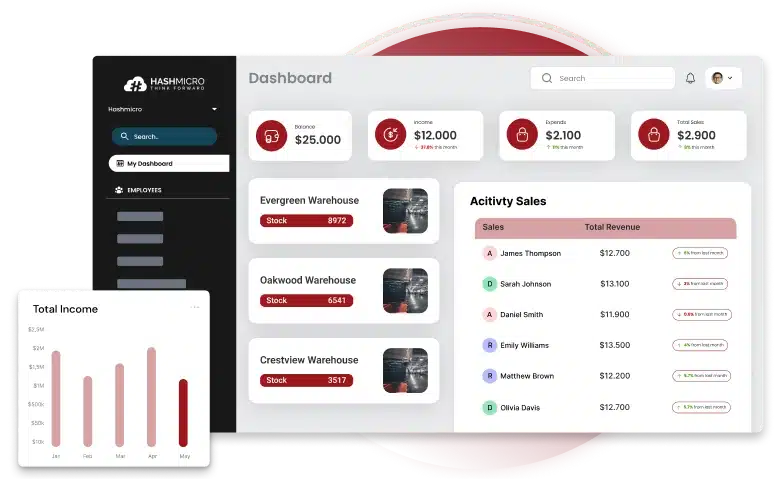
Why choose HashMicro? HashMicro offers industry-specific logistics solutions that combine core logistics functions with smart automation tailored to meet the unique needs of Filipino businesses.
With over 2,000 satisfied clients, HashMicro is a leading provider of Logistics Management Software (LMS) in the Philippines, trusted by businesses of all sizes. HashMicro is dedicated to delivering top-notch solutions that help you optimize your logistics.
Moreover, it does not require a credit card to get started, zero-cost demo for the software, which is an opportunity for companies wanting to see what it’s capable of.
HashMicro Logistics Software can also integrate with various other systems, such as inventory systems, warehouse management systems, and sales platforms.
Whether you’re handling inventory, tracking shipments, or optimizing delivery routes, HashMicro equips you with the tools to transform your logistics into a smooth, efficient operation.
Some of the key features that help eliminate logistics hurdles include:
- Real-Time Updates: HashMicro keeps customers informed on delivery status the moment it changes, offering full transparency every step of the way.
- Vehicle Scheduling: With automated vehicle assignment, the software selects the best option for each delivery to cut down on time and costs.
- Fuel Management: Real-time odometer tracking provides precise insights into fuel use, helping you manage expenses effectively.
- Delivery Tracking: Delivery details, including vehicle type and transporter, are accessible anytime, anywhere.
- Fleet Management: Track vehicle locations and mileage with GPS and odometer data, making it easier to analyze trip times and improve fleet use.
- Report Generation: Generate custom, detailed reports with diagrams for insights into operations and better decision-making.
- Travel Management: All travel records are centralized, allowing for easy route planning and efficient transport.
| Pros | Cons |
|
|
HashMicro also offers transparent pricing plan with no added costs, as well as competitive price for the service it offers. To get a customized quote, click on the banner below!

2. Oracle Transportation Management
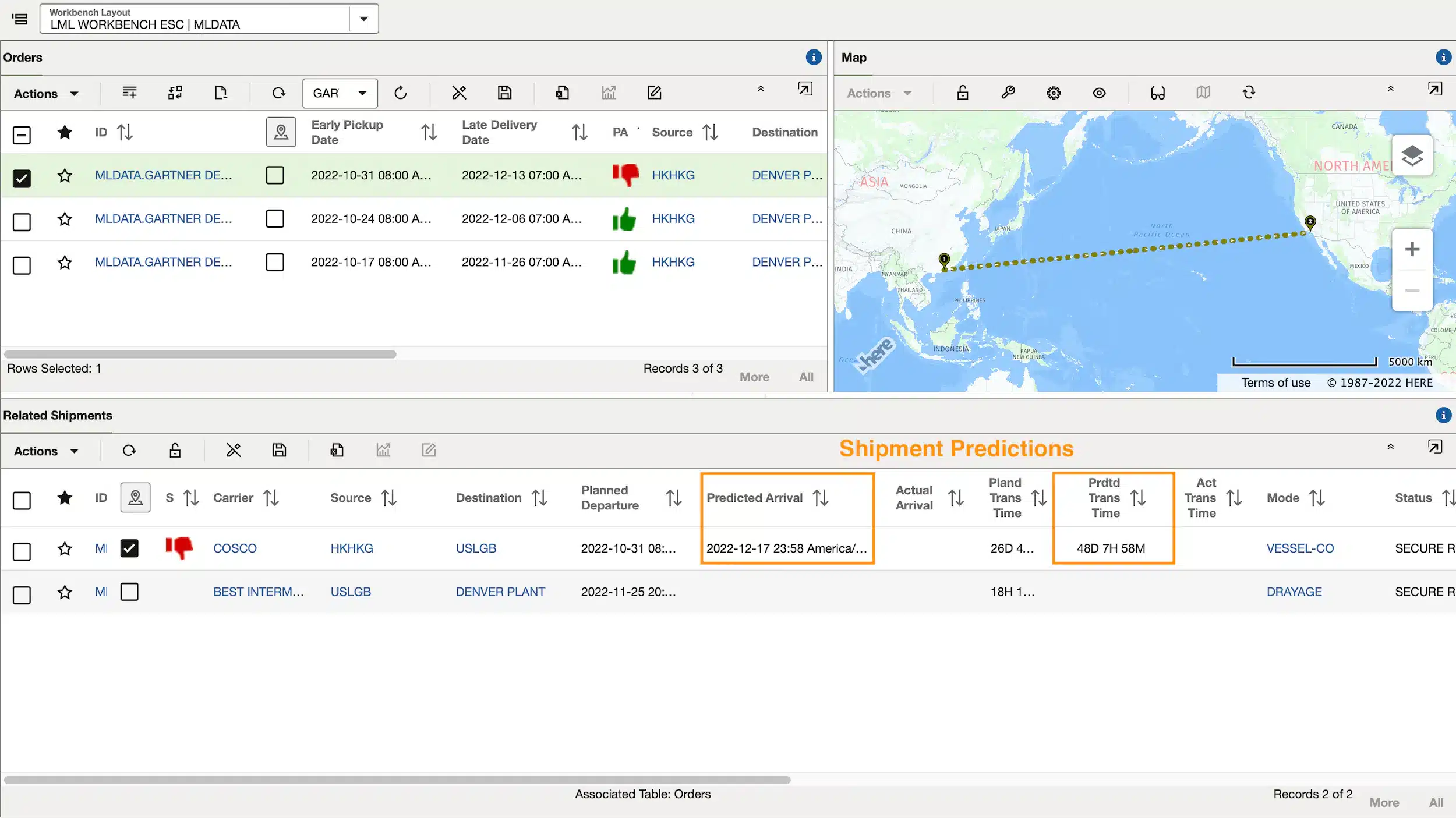
Oracle Transportation Management (OTM) is a cloud-based logistics software in the Philippines for managing transportation across supply chains. It handles order management, shipment planning, and freight auditing in one platform.
With real-time shipment tracking, businesses can monitor progress and address delays. Its optimization engine selects the most cost-effective carriers and routes while considering constraints. OTM also supports multi-modal transport and integrates with enterprise systems for seamless logistics management.
Why choose OTM? OTM is ideal for industries like manufacturing and distribution in the Philippines seeking comprehensive transportation planning and execution capabilities.
Pricing: Oracle Transportation Management offers its service starting from $600 monthly subscription.
Features:
- Pricing Management System
- Route Optimization
- Automated Task Management System
- Real-Time Network Modeling
- Forecasting Analysis
| Pros | Cons |
|
|
3. SAP Transportation Management
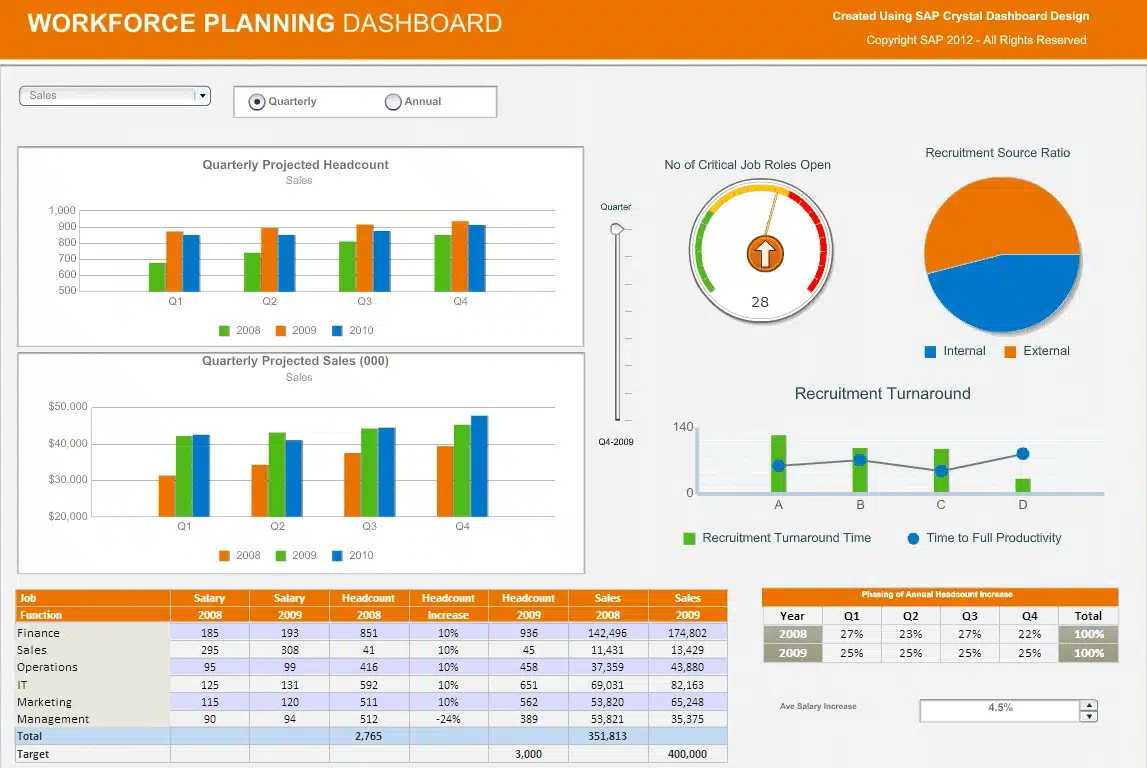
SAP Transportation Management (TM) is a key component of SAP’s design-to-operate strategy, focused on enhancing digital supply chains. The software offers flexibility to plan, execute, and settle freight for both global and domestic supply chains.
Available in cloud or on-premises, SAP adapts to business needs for efficient supply chain management.
Why choose SAP? SAP TM is well-suited for businesses that require seamless integration with existing SAP ERP systems. This integration facilitates efficient logistics and supply chain management
Pricing: This service is charged in increments of PHP 150,000,000 in annual spending or the equivalent in your local currency supported by SAP. Only freight expenses, covering all costs related to product transportation, are included in the calculation for this Cloud Service.
Features:
- Efficient Route Planning
- Automation Powered by AI
- Adaptable Tendering Process
- Customizable Scalability
- Improved Load Optimization
- Logistics Execution
| Pros | Cons |
|
|
4. ClickUp
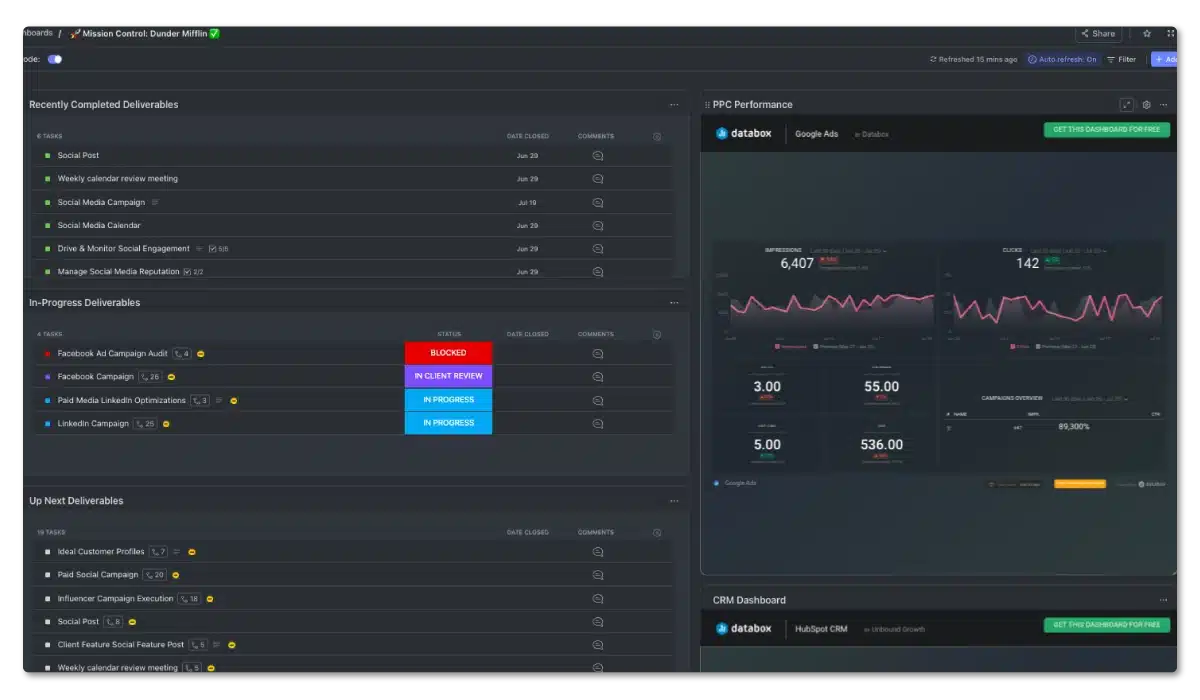
ClickUp is a cloud-based tool for project management and collaboration. Though it serves a variety of needs, ClickUp is also effective fortracking shipments, optimizing routes, and coordinating teams in real-time for logistics companies.
Logistics teams can organize, track, and carry out their operations within a single platform. It helps logistics teams stay on top of order tracking, inventory monitoring, and shipping coordination.
Why choose ClickUp? ClickUp is a versatile project management tool that can be adapted for logistics operations. It’s ideal for enterprises in the Philippines looking for a user-friendly solution to manage tasks and workflows.
Pricing: ClickUp provides a free plan along with three paid options for logistics management. The Unlimited plan starts at $7 per user per month, the Business plan costs $12, and the Enterprise plan is available with custom pricing.
Features:
- Customizable Views for Task Management
- Real-Time Collaboration Tools
- Dashboard KPIs and Visual Widgets
- Document Syncing with Team Workflows
| Pros | Cons |
|
|
5. Acumatica
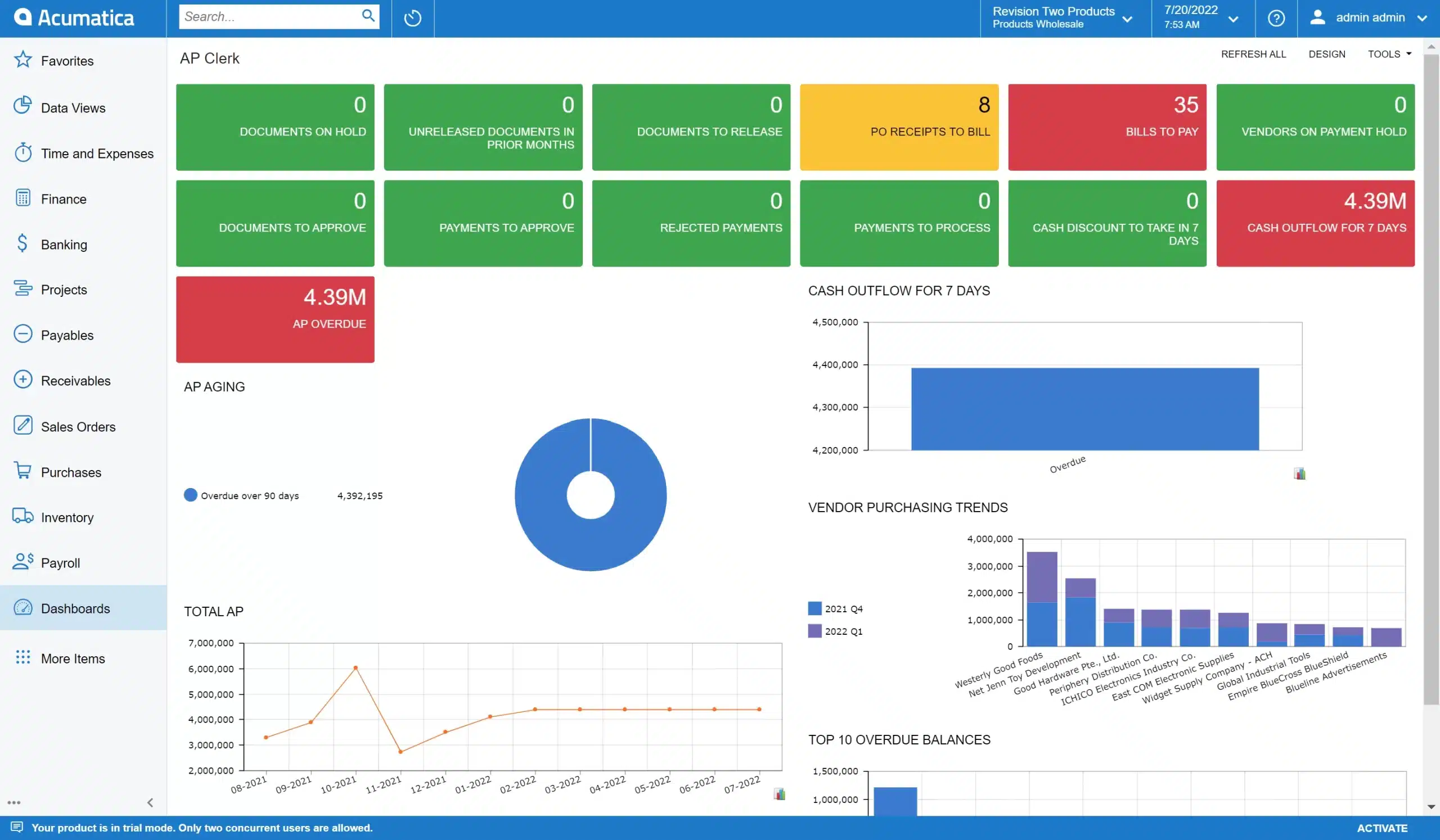
Acumatica is a cloud-based ERP solution offering a complete range of business management applications, including logistics tools like inventory management, order tracking, warehouse control, and order processing.
It also helps balance supply and demand through omnichannel sales while optimizing inventory levels and warehouse operations with its built-in WMS. Businesses can boost sales with an integrated CRM, gain real-time insights using advanced reporting tools, and simplify financial management with a comprehensive accounting suite.
Why choose Acumatica? Acumatica offers a cloud-based ERP with strong logistics modules, making it suitable for growing Filipino businesses that need scalability and flexibility in their logistics and supply chain operations.
Pricing: Acumatica’s annual subscription starts at $6,000, covering 5–10 users and 1,000 monthly transactions. Mid-sized businesses typically spend $25,000 or more for additional users and transactions. Implementation costs range from $60,000 to over $100,000.
Features:
- Efficient Route Planning
- Adaptable Tendering Process
- Customizable Scalability
- Improved Load Optimization
| Pros | Cons |
|
|
6. Zoho
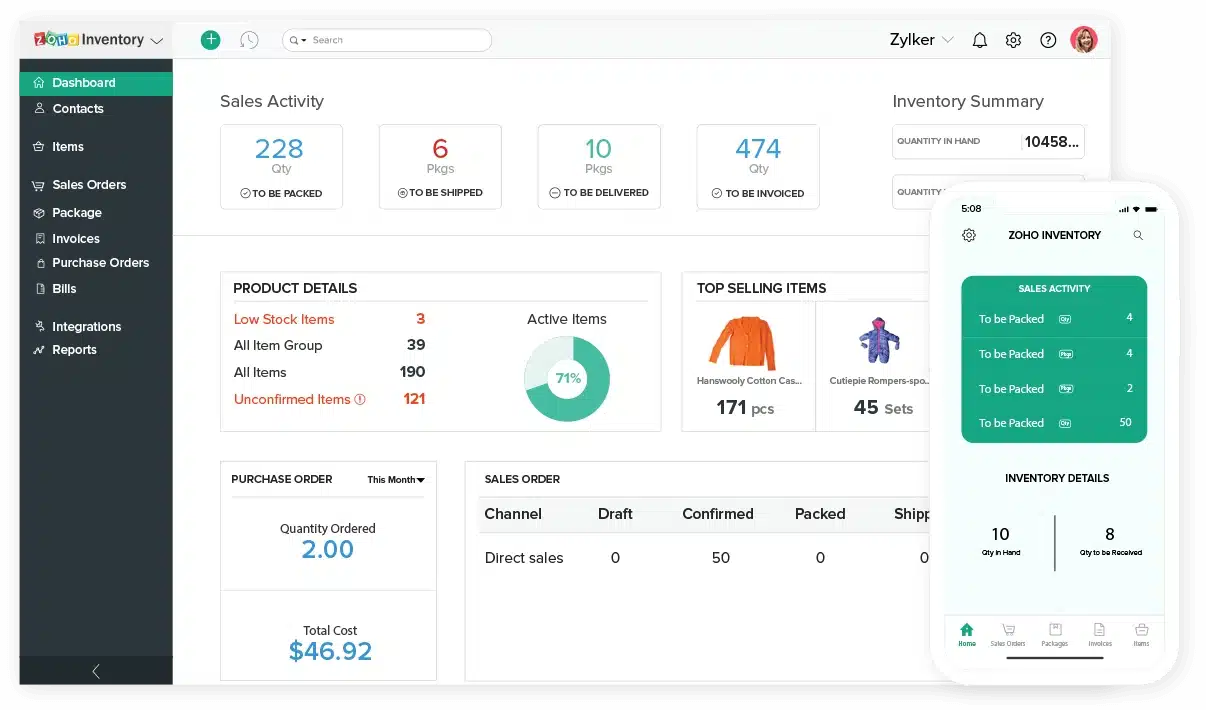
Zoho Inventory is a user-friendly customizable logistics management software helps you handle deliveries, vehicles, and drivers seamlessly. With automated email/SMS notifications and full mobile support, your logistics operations stay smooth and efficient.
View all essential data in one place. The dashboard provides real-time updates on orders, pending shipments, and trip revenues, giving you instant access to key logistics insights.
Why choose Zoho? Zoho Inventory is perfect for SMEs in the Philippines that operate across multiple sales channels, including e-commerce.
Pricing: Zoho Inventory’s pricing starts at $39.00 per month with a flat rate. This is for their basic plan, which offers a range of inventory management features. They may also have different tiers depending on the size and needs of your business.
Features:
- Integration with Shipping Carriers
- Batch & Serial Number Tracking Across Channels
- Auto-reordering with Preferred Vendors
- Order & Trend Insights Reports
| Pros | Cons |
|
|
7. Salesforce 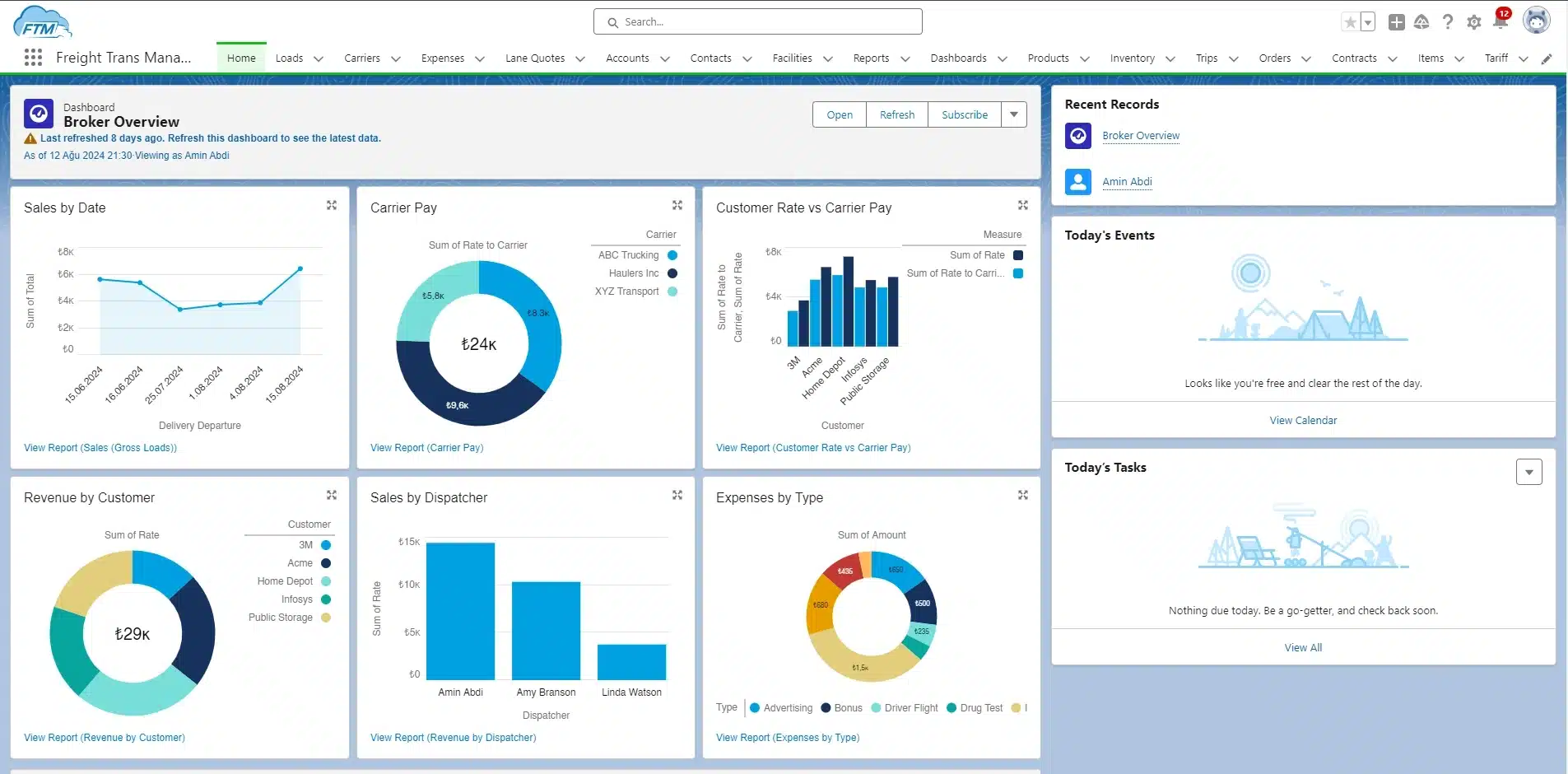
Salesforce for Transportation and Logistics Service Providers integrates with Salesforce CRM to provide specialized features like contact management, process automation, and shipment tracking.
The platform enables you to transform logistics into a smooth, customer-focused operation with integrated supply chains and a comprehensive view of the shipping process.
Why choose Salesforce? Salesforce is ideal for businesses that prioritize customer relationship management alongside logistics. Its robust CRM capabilities, combined with logistics modules, support operational efficiency.
Pricing: Salesforce offers four pricing plans—Standard ($29/month) for basic inventory needs, Professional ($79/month) with serial and batch tracking, Premium ($129/month) adding automation and barcode generation, and Enterprise ($249/month) with more users and locations.
Features:
- Unified Customer View
- Real-Time Shipment Tracking
- Automation and Process Optimization
- Advanced Analytics and Reporting
| Pros | Cons |
|
|
8. Brightpearl
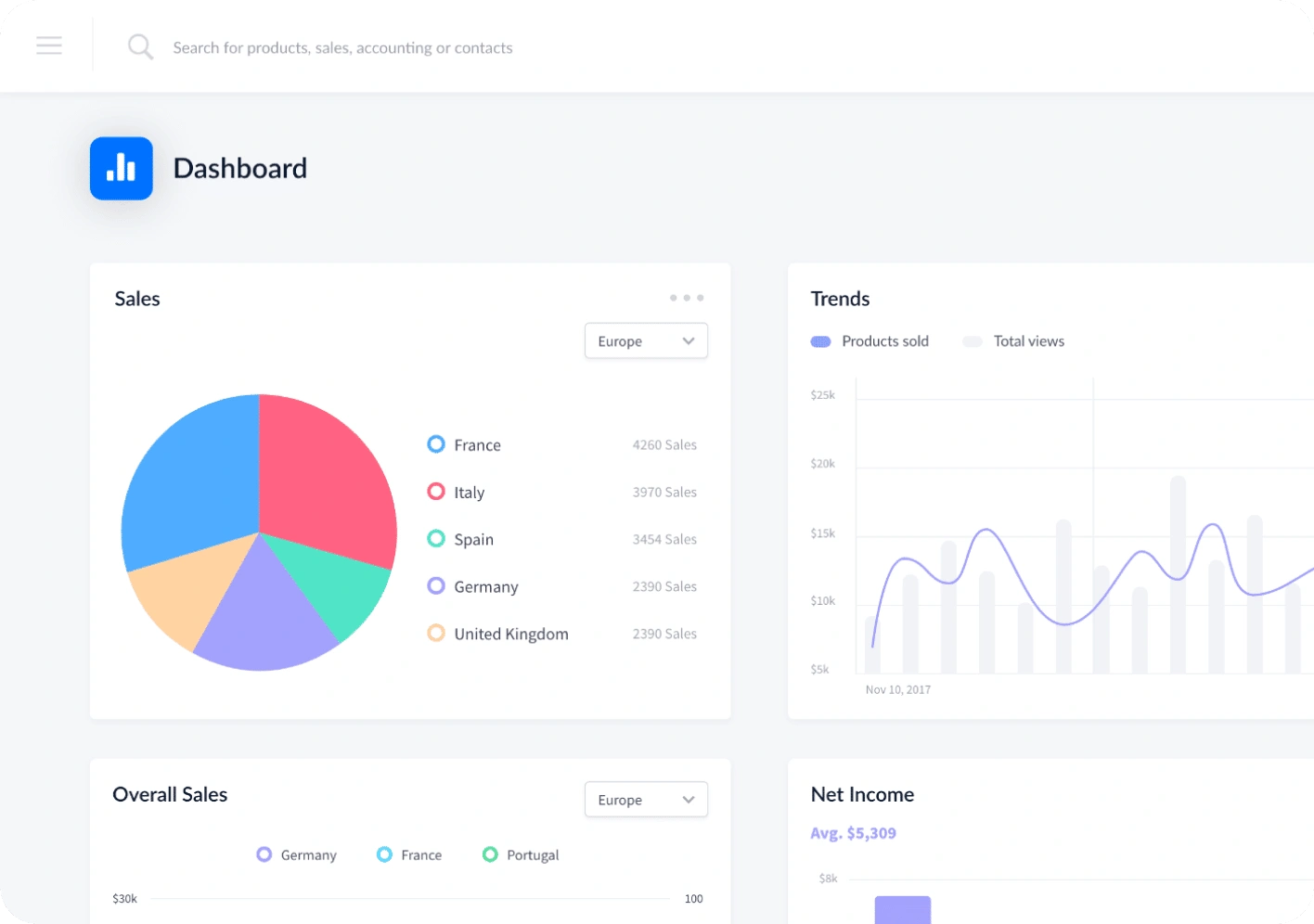
Brightpearl is a top retail operations management system that handles inventory planning, management, shipping, fulfillment, and order procurement. It also features a retail-focused CRM, enabling stronger customer relationships.
Why choose Brightpearl? Brightpearl is tailored for retail and wholesale businesses, offering integrated inventory and order management. It’s suitable for Filipino retailers seeking to unify their sales and logistics processes.
Features:
- Inventory Buying Recommendations
- Multi-Channel Inventory & Order Management
- Intuitive Dashboard for Key Metrics
- Integrated Retail CRM
| Pros | Cons |
|
|
9. Quixy
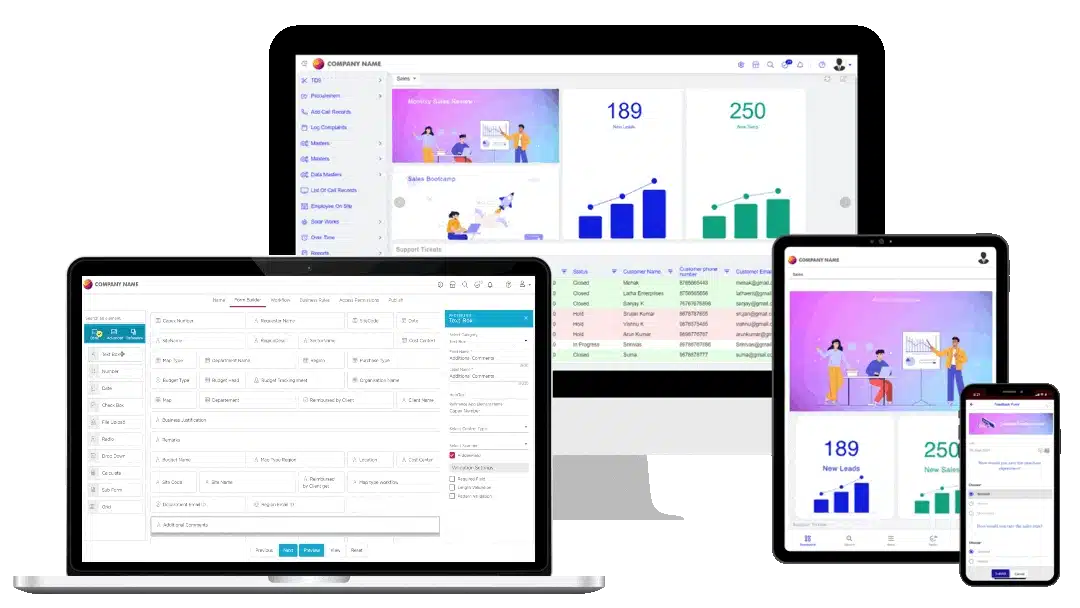
Quixy is a logistics app development provider offering a no-code/low-code platform for building and managing custom applications with ease. Its no-code logistics software lets users create tailored apps for operations like inventory management, order tracking, supply chain management, and freight logistics.
Why choose Quixy? It’s ideal for businesses that require tailored solutions without extensive coding, offering flexibility to adapt to specific operational needs.
Features:
- Workflow Automation
- Real-Time Analytics
- Integration Capabilities
- Automated Notification and Alerts
| Pros | Cons |
|
|
10. Fishbowl
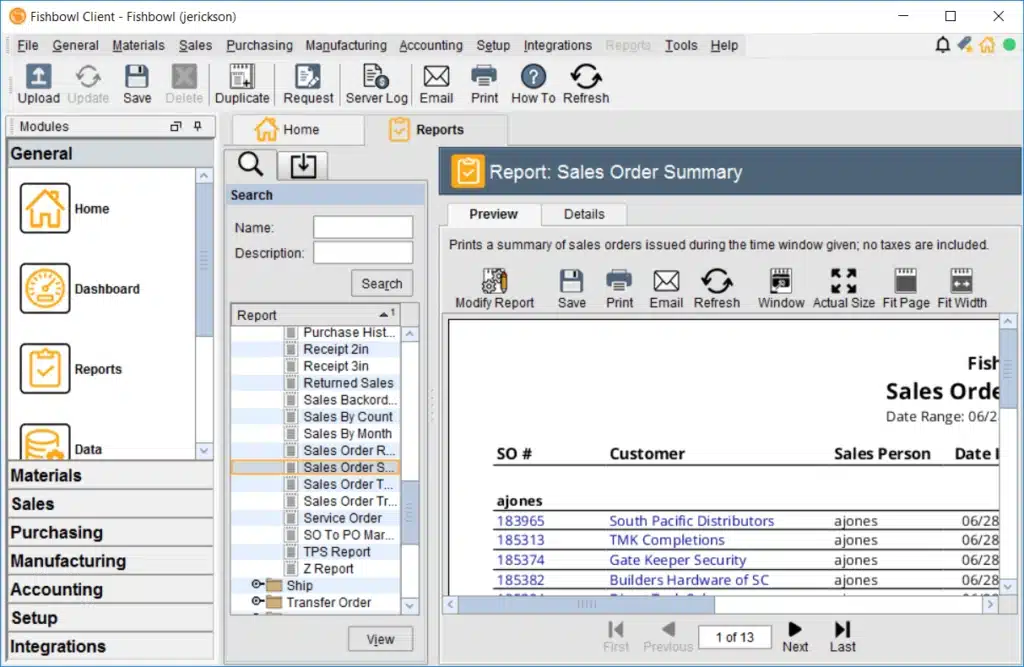
Fishbowl is a logistics management software that helps businesses manage inventory, warehousing, and production in one place. Designed for SMBs, Fishbowl comes in two versions: Fishbowl Drive for cloud access and Fishbowl Advanced for on-premises use.
Both versions support the smooth handling of daily logistics operations for businesses of all sizes.
Why choose Fishbowl? Fishbowl is suitable for SMEs that need robust inventory management integrated with QuickBooks. It’s beneficial for businesses looking to enhance inventory control without overhauling their existing accounting systems.
Features:
- Barcode-Enabled Inventory Management
- Automated Stock Counts
- Customizable Workflows for Manufacturing Automation
- Automated, Customizable Reporting
| Pros | Cons |
|
|
11. Infor
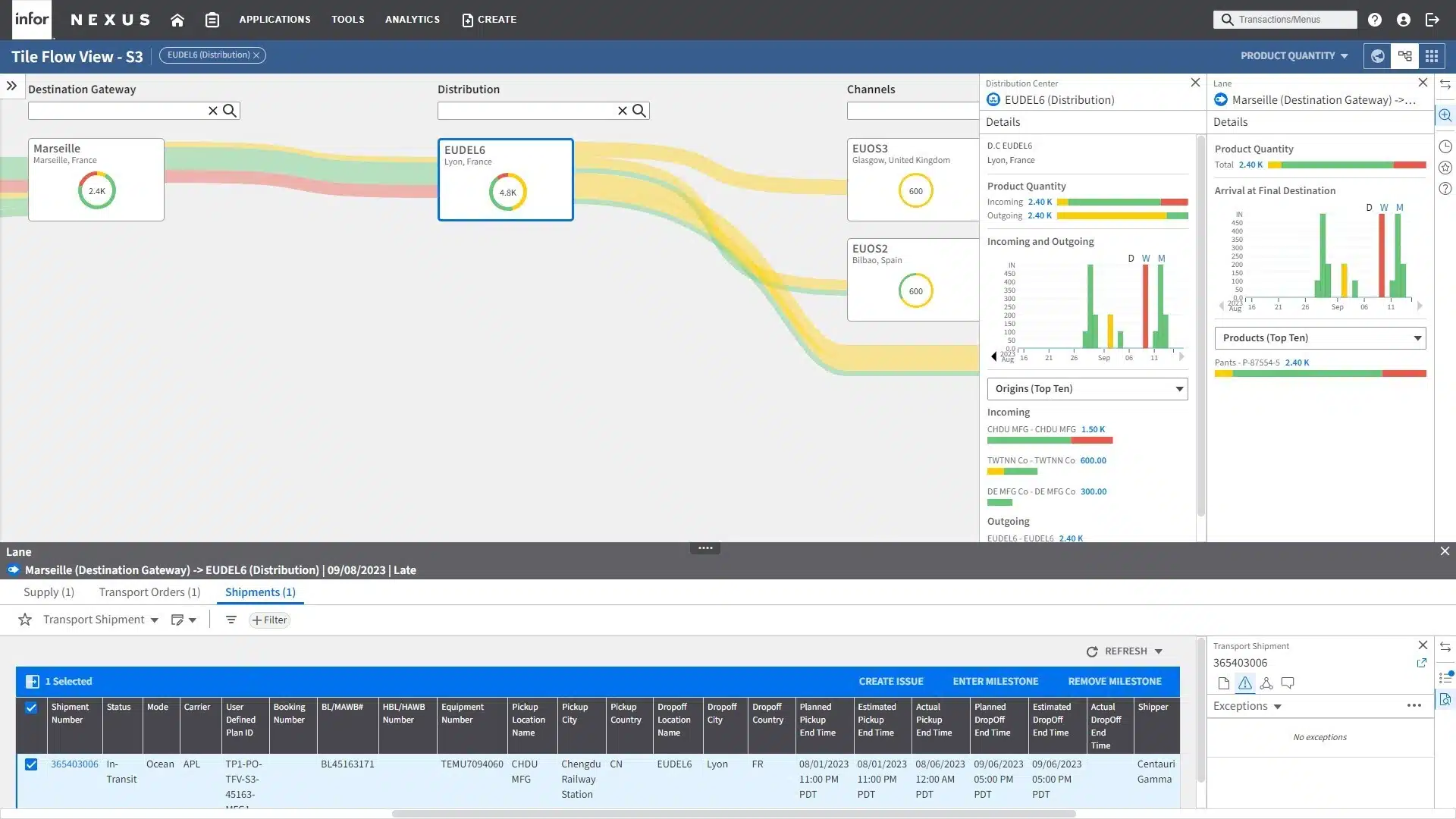
Infor Nexus is a global logistics management solution designed to enhance inventory systems, custom delivery, order fulfillment, and trucking logistics. It provides versatile transportation logistics software supporting air, ocean, truck, and parcel modes.
Why choose Infor? Infor offers comprehensive logistics and supply chain solutions with industry-specific functionalities. It’s ideal for larger enterprises in the Philippines seeking advanced analytics and reporting capabilities.
Features:
- Efficient Route Planning
- Adaptable Tendering Process
- Customizable Scalability
- Improved Load Optimization
| Pros | Cons |
|
|
12. Trimble
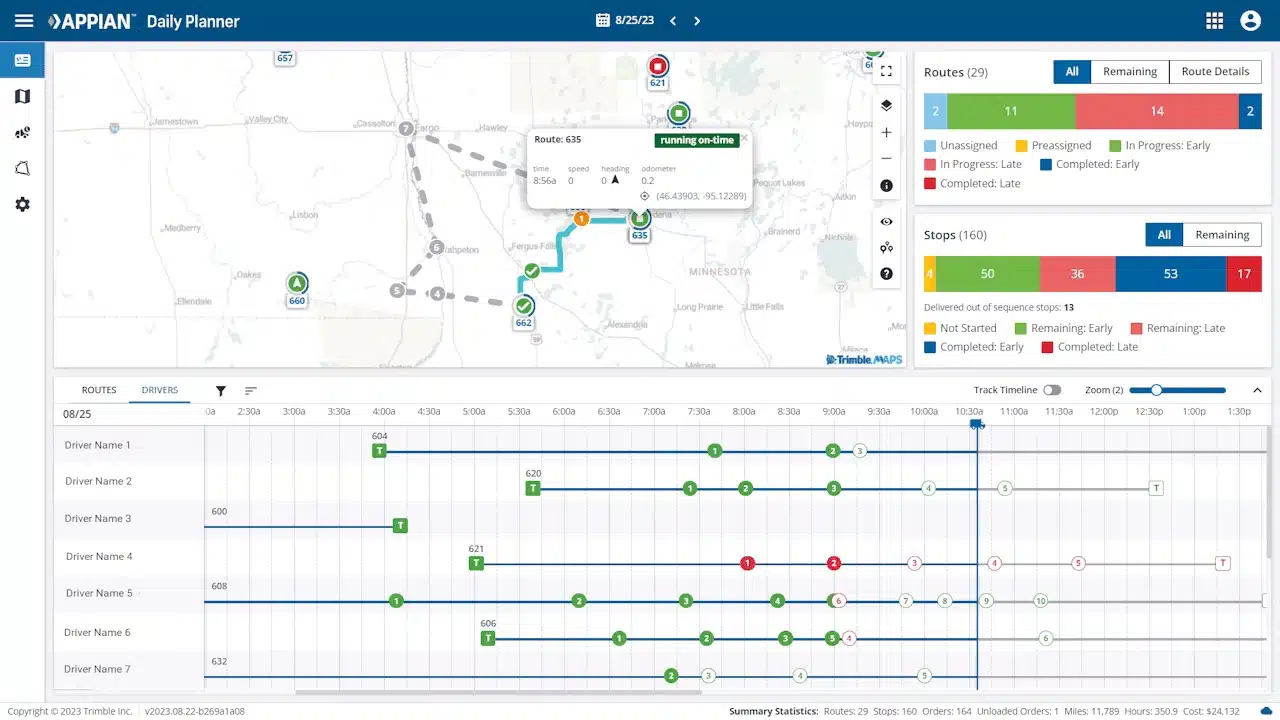
Trimble Fleet Mobility logistics software helps businesses run smoothly with advanced technology. It offers real-time tracking, supports better decision-making, and simplifies logistics workflows.
Why choose Trimble? Trimble specializes in transportation and fleet management, making it suitable for logistics companies in the Philippines that require real-time tracking and route optimization to improve fleet efficiency.
Features:
- Optimized Asset Usage
- Seamless Integration Features
- Enhances Performance Management
- Data Analytics and Insights
| Pros | Cons |
|
|
What You Should Look For in Logistics Software
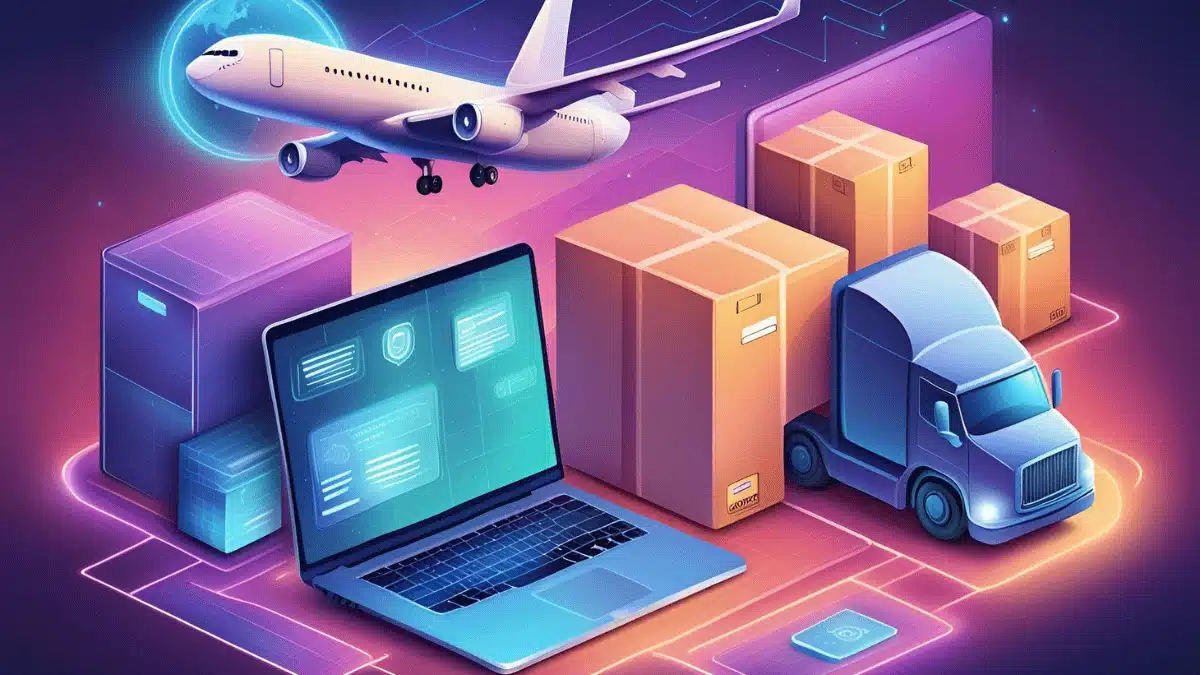
When selecting business logistics software, it’s important to recognize that there’s no universal solution. Prices can vary significantly, ranging from a few hundred to several thousand pesos. Here’s what to look for when choosing logistics software, starting with the most essential:
- Key Features: Make sure the software has the core functions you need for daily logistics tasks. These are what you’ll rely on most.
- Full Supply Chain View: Look for software that gives you a clear picture of your entire logistics process, from packaging all the way to delivery.
- Real-Time Tracking: A good tool offers real-time updates and easy-to-read dashboards, so you can track key performance numbers at any time.
- Seamless Integrations: The software should connect well with your current CRM and ERP systems, making it easier to sync data without double entry.
- Business Fit: Find software that fits your business size, shipment volume, and product type. It should work well for your specific needs.
- Scalability: As your business grows, your software should be able to expand with it, ideally without hidden or high extra costs.
With these features, you’ll have a logistics tool that works smoothly as your business grows.
Conclusion
Efficient logistics management is essential for businesses looking to improve operations, boost efficiency, and keep customers happy. Strong logistics software helps companies better manage inventory, shipping, and delivery, which leads to cost savings and better service.
Selecting the right LMS is a key business decision, requiring features like real-time updates, vehicle scheduling, fuel management, and delivery tracking to stay competitive in a fast-moving market. After all, huwag magpahuli sa agos; staying ahead is crucial!
HashMicro’s logistics management software stands out with powerful features tailored to various logistics needs, enhancing efficiency and adapting to your business. Try a free demo today!

FAQ About Logistics Management Software
-
What are the main features of logistics software?
Logistics software includes features like tracking shipments, managing orders, planning deliveries, and analyzing data. These tools help businesses save time and ensure operations run smoothly.
-
How does logistics software improve customer satisfaction?
It provides real-time updates and accurate tracking, helping customers know where their orders are and when they will arrive. This makes the delivery process more reliable and builds customer trust.
-
What are the procedures for integrating logistics management software with existing ERP or CRM systems?
The procedure involves selecting the appropriate software to meet the specific needs of your business.
– Work closely with the IT team to facilitate a seamless integration.
– Determine the method of data transfer between systems (APIs, Excel, Manual).
– Conduct thorough testing with various scenarios to verify data accuracy.
– Focus on data security and real-time monitoring.
– Provide training for your team on the new integrated system and implement the integration with future scalability in mind.
– Connecting your ERP or CRM system with HashMicro will boost efficiency and data accuracy, paving the way for a more successful future. -
Is logistics software scalable for growing businesses?
Yes, logistics software can grow with your business. As your company expands, the software can handle more shipments, inventory, and data without slowing down operations.
-
What security protocols are implemented to safeguard sensitive logistics data in logistics management software?
A reliable Logistics Management Software provider should implement top-notch security protocols to protect your data. This includes encryption, role-based access control, regular security audits, and adherence to the latest security standards.
-
Why should my company think about adopting logistics management software?
Adopting Logistics Management Software can take your business to the next level. It streamlines operations, cuts down on operational costs, improves customer satisfaction, and provides real-time insights. With logistics software solutions, you’ll be able to fully unlock your business’s potential and increase your revenue!



































